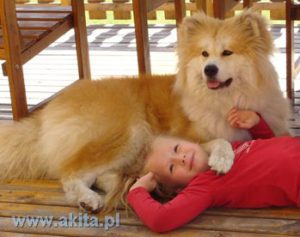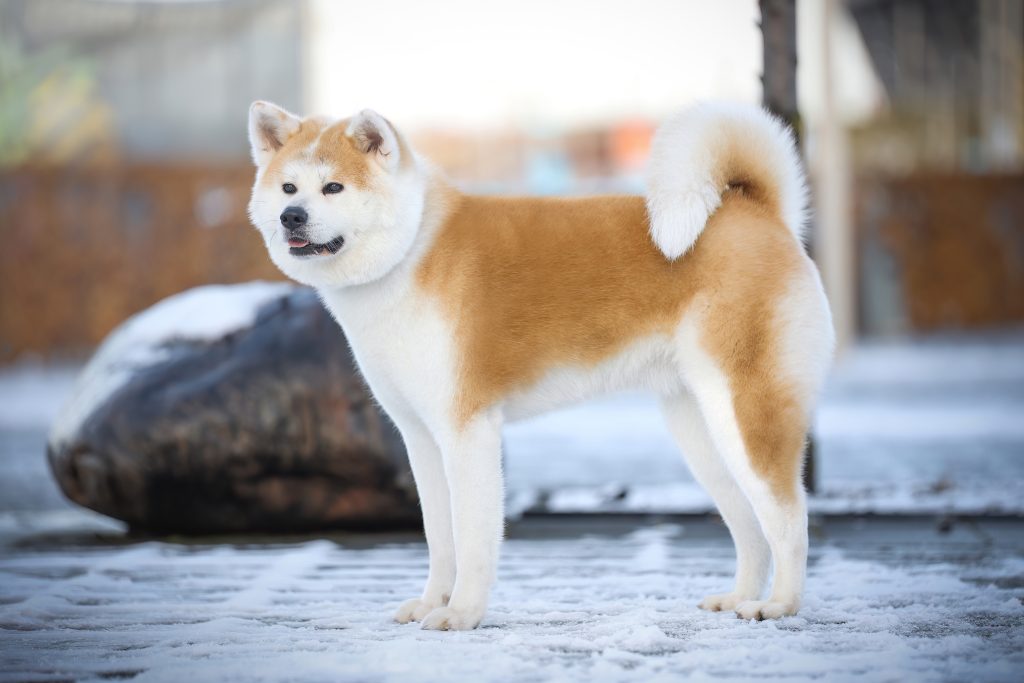


These questions are repeated so often that I was supposed to write about them a long time ago. However, due to constant lack of time, I kept postponing it until later. However, now that I have finished my studies and I can devote more time not only to my dogs but also to updating the website about Akitas and expanding the website about the newest member of the household - a tiny Shikoku female dog. But back to the topic...
By its nature, the Akita is not only a guard but also a family dog. He loves his family and defends them. He loves children very much, often showing this love too effusively ;-). Some Akitas can easily be compared to a "furry" type of baby monitor, because they watch over a sleeping baby, and when the baby wakes up and, for example, cries, they try to notify the household that it's time to take care of the baby. They also often stare at a toddler speaking in a child's language as if they understood what he was saying to them - their focused eyes try to read every word from the toddler's mouth ;-).
However, I would like to clarify that all this applies to Akitas with good origins (from balanced parents and good breeding) and not to Akita-type dogs (so-called pedigree dogs - please read the "STOP TRADERS" section) purchased somewhere on a stock exchange or at an exhibition. No one knows the ancestors of such dogs, let alone the character of their parents or grandparents. Character is inherited from parents, and often also from grandparents, so it is extremely important to select the appropriate breeding pair so that its offspring have a good prognosis not only "optically" but also characterologically. Not to mention the fact that when raising a dog from the proverbial stock exchange, you will be left to your own devices and there will be no breeder who could help you and give you good advice... As a result, such dogs most often end up on Allegro again, where random buyers try to get rid of the dog that they have lost. they couldn't cope with raising themselves. And they do it under various pretenses - recently the so-called "fashionable" is a long-term trip abroad - no one will write that they simply couldn't cope. It's a pity because it would be a warning to gullible buyers of cute Akita-like puppies who want to have a good Akita... but cheaply. As if both of these things could be reconciled and have a beautiful, healthy and trustworthy dog whose parents, grandparents and even great-grandparents have been tested for genetic diseases.
Proper upbringing of the Akita is the second important factor and the Akita should be socialized with children from the very beginning. If the baby appears in a house where there is an Akita, you should let the dog get to know the new member of the pack as soon as possible. Let him sniff the baby (under control, of course) and even lick the baby's hand or leg. You should not hide your toddler from the dog, because if he is curious, he may jump on the bed to see what is hiding there. The stupidest possible solution and one that may have the worst consequences is to try to separate the dog and the child. So, you need to introduce the child to the dog as early as possible, calmly, and make him realize that the family has grown and the Akita has another little person under his care. At the same time, we need to make the dog feel that we do not love him at all because of this and that he still belongs to the family and not suddenly be locked up and isolated from people because a child was born. In such a situation, the dog feels rejected and may become jealous of the baby. Akita likes to play with children, both at home and on walks. It is a great companion not only for children but also for teenagers. He loves playing on the beach or in the snow. However, in the case of small children, you should also take into account that they may harm the dog. And I'm not even talking about pulling the ears or tail, but about damaging a dog's eye due to, for example, a fork held by a child.
A small child can unknowingly hurt a dog. They should be taught to respect the four-legged family member and to give him a break sometimes. Remember that a dog - because it sleeps extremely alertly - needs a lot of sleep. If the child uses it too intensively and is unable to sleep, the Akita will become irritable and nervous, which may end badly for the child. If the Akita goes to its place, it means that it has had enough fun and should be given a rest. The dog must always feel at home and safe on its bed. This is his refuge and the child should respect it. You need to explain that the dog is resting now. Once he rests, he will soon be ready to play again. Please remember that a dog is not a toy.
Akitas raised with children are, by their nature, very protective of them. However, please remember that the Akita is a large and quite heavy dog, so leaving small children unattended is not advisable. The same applies to most large breeds. So they appeal to parents to have imagination sensitive enough to realize what could happen.
For example, a passing dog may accidentally push a child onto a piece of furniture with its weight; all it takes is for the child to fall over and hit a sharp edge, and the disaster is ready. And it won't be the dog's fault, but only the parents' fault, who simply lacked imagination and didn't keep an eye on their child. It is also not a very good idea to let small children take the dog for a walk. The Akita, as a dog also used for sledding, is extremely strong and can pull hard. A small child will not be able to keep it on a leash. This may end badly for both of them, because the child may fall over and the dog may fall under a car, for example, or run away from a female dog in heat, or fight with another dog. The child will also not be able to react appropriately if a strange dog running loose (often without a muzzle, unfortunately) attacks our Akita. So I would like to remind you once again that an adult is responsible for the dog, including any damage caused by the dog.
Most Akitas are terrible clings and although they should not sleep on the beds of other people, they love to sleep in their owners' arms.
Akitas in homes with small children or people planning to have children should be especially carefully trained not to jump on children when greeting them, but only to greet them while standing or even sitting. You must be aware that a happy and greeting dog has its own measurable weight and when it jumps on a child, it may simply knock it over.
Establishing a hierarchy in the herd at home where the child is is a separate matter. From the very beginning, the Akita must be aware that its place in the herd of people is after the youngest child in the family, not before this child. The ways to show an Akita his place in the herd are very simple and do not require the use of force, only consistency and reminding him from time to time where his place is in the hierarchy. The breeder should tell you how to do this and provide you with advice and assistance if necessary.
The most recommended for children (especially small ones) is the non-exhibition variety of Akita - the so-called long-haired Akita - which is not only exceptionally communicative and willing to cooperate, but above all extremely gentle towards babies. (description can be found in the "Long-haired Akita" section).
The photos show Akitas with the nickname "Akita u Izis FCI": ZENKO, UTA, YAE, TADA, WAHEI, ZAMA, WAKI, DAI.